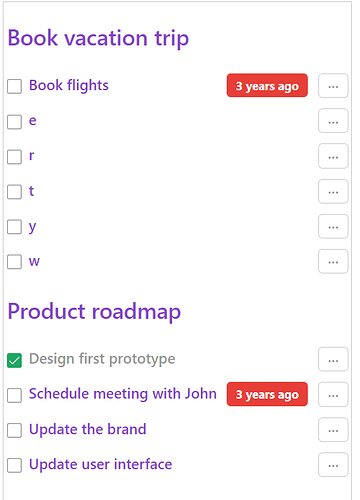I am trying to learn the basics of Projectify plugin
Consider the following scenario:
* Project-1
* Subproject-1.1
* Subproject-1.1.1
* Task-1.1.1.1
* Task-1.1.1.2
* Project-2
* Subproject-2.1
* Subproject-2.1.1
* Task-2.1.1.1
I would like a way to see: a list of all tasks (as in, “leaves” from all project trees), sorted by project.
By creating a couple of subproject/tasks, I’ve noticed that a “leaf”:
- has a
todotag - does not have a
SubProjecttag
This means that I can solve half of my problem like this:
<<list-links "[tag[todo]!tag[SubProject]]">>
This will produce something like:
* Task-1.1.1.1
* Task-1.1.1.2
* Task-2.1.1.1
Unfortunately, I’m stuck here, because I don’t know how to include the project name. My goal is to have links (still pointing to the “leaf” task tiddlers, but with names like this:
* [Project-1] Task-1.1.1.1
* [Project-1] Task-1.1.1.2
* [Project-2] Task-2.1.1.1
Is it possible to be done in a trivial way, not involving complex programming with tree walking algorithms, which is scary for an newbie TiddlyWiki end user?
